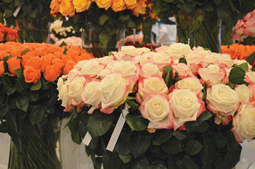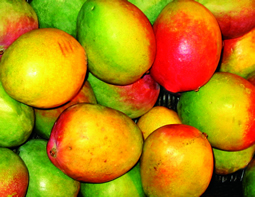 Summer is around the corner, and it will most likely be another record-breaking one. On those blazing hot summer days, you are doing everything possible to stay cool, aren’t you? Well, flowers require the same!
Summer is around the corner, and it will most likely be another record-breaking one. On those blazing hot summer days, you are doing everything possible to stay cool, aren’t you? Well, flowers require the same!
When the heat rises, flowers will – just like people – rapidly start to increase their respiration. The need for water intake greatly increases, to maintain the right temperature and not dry out.
The best treatment for cut flowers is to maintain a constant temperature and avoid extreme heat, cold or drafts. If the temperature does spike, check the water levels and if condensation has developed on the inside of sleeves. Remove sleeves with condensation immediately, to prevent botrytis and other dangers.

 With the world’s human population expected to reach nearly 10 billion by 2050 and the negative impact of climate change on agriculture, maintenance of a stable global food supply is under significant threat.
With the world’s human population expected to reach nearly 10 billion by 2050 and the negative impact of climate change on agriculture, maintenance of a stable global food supply is under significant threat. The EU continues to set and re-set pesticide and fungicide Maximum Residue Level (MRLs) at far stricter levels than internationally agreed standards. ACP exporters serving EU markets have no option but to comply or exit the EU market. Freshfel’s call for ‘better defined international standards’ to facilitate EU fruit and vegetable exports, since uneasily with the unilateral standard setting practiced by the EU, which regularly presents new compliance challenges for ACP fruit and vegetable exporters. This raises important policy issues regarding the EU’s role in the de facto setting of international standards and the limitations of SPS chapters and institutional mechanisms established under trade ACP-EU FTAs for ensuring EU markets remain open to ACP products which comply with agreed international regulatory standards.
The EU continues to set and re-set pesticide and fungicide Maximum Residue Level (MRLs) at far stricter levels than internationally agreed standards. ACP exporters serving EU markets have no option but to comply or exit the EU market. Freshfel’s call for ‘better defined international standards’ to facilitate EU fruit and vegetable exports, since uneasily with the unilateral standard setting practiced by the EU, which regularly presents new compliance challenges for ACP fruit and vegetable exporters. This raises important policy issues regarding the EU’s role in the de facto setting of international standards and the limitations of SPS chapters and institutional mechanisms established under trade ACP-EU FTAs for ensuring EU markets remain open to ACP products which comply with agreed international regulatory standards. The current Covid-19 disruptions of Kenyan exports to Europe, particularly along triangular supply chains to the UK, highlights the importance of shortening supply chains by wherever possible, contracting with the final retailer and shipping products directly. For exporters who can get to grip with current logistical challenges, rising EU demand for fruit and vegetables and rising prices could yield commercial benefits to counter-balance some of the Covid-19 disruptions. This is particularly the case since labour shortages in the fruit and vegetable sectors as a result of disruptions to labour flows could depress fruit and vegetable production throughout 2020.
The current Covid-19 disruptions of Kenyan exports to Europe, particularly along triangular supply chains to the UK, highlights the importance of shortening supply chains by wherever possible, contracting with the final retailer and shipping products directly. For exporters who can get to grip with current logistical challenges, rising EU demand for fruit and vegetables and rising prices could yield commercial benefits to counter-balance some of the Covid-19 disruptions. This is particularly the case since labour shortages in the fruit and vegetable sectors as a result of disruptions to labour flows could depress fruit and vegetable production throughout 2020. With nearly 40% of Kenya’s direct exports to the UK currently benefitting from significant margins of tariff preferences, concerns have arisen around the UK’s current MFN tariff review and the future basis for Kenya’s continued duty-free access to the UK market after 1st January 2021. In addition, there are growing concerns about the future commercial viability of the use of triangular supply chains for the delivery of Kenyan short shelf life products to the UK market if no comprehensive EU/UK trade agreement is in place by 1st January 2021. Any future EU/UK trade agreement would need, as far as possible, to replicate the current frictionless trade, on which the operation of these triangular supply chains depends. This is looking increasingly unlikely. The Government of Kenya thus faces a triple challenge in ensuring a continuation of current patterns of exports to the UK market into 2021.
With nearly 40% of Kenya’s direct exports to the UK currently benefitting from significant margins of tariff preferences, concerns have arisen around the UK’s current MFN tariff review and the future basis for Kenya’s continued duty-free access to the UK market after 1st January 2021. In addition, there are growing concerns about the future commercial viability of the use of triangular supply chains for the delivery of Kenyan short shelf life products to the UK market if no comprehensive EU/UK trade agreement is in place by 1st January 2021. Any future EU/UK trade agreement would need, as far as possible, to replicate the current frictionless trade, on which the operation of these triangular supply chains depends. This is looking increasingly unlikely. The Government of Kenya thus faces a triple challenge in ensuring a continuation of current patterns of exports to the UK market into 2021. d weddings have been called off and event planners pulled the plug en masse, cancelling all orders of flowers.
d weddings have been called off and event planners pulled the plug en masse, cancelling all orders of flowers.